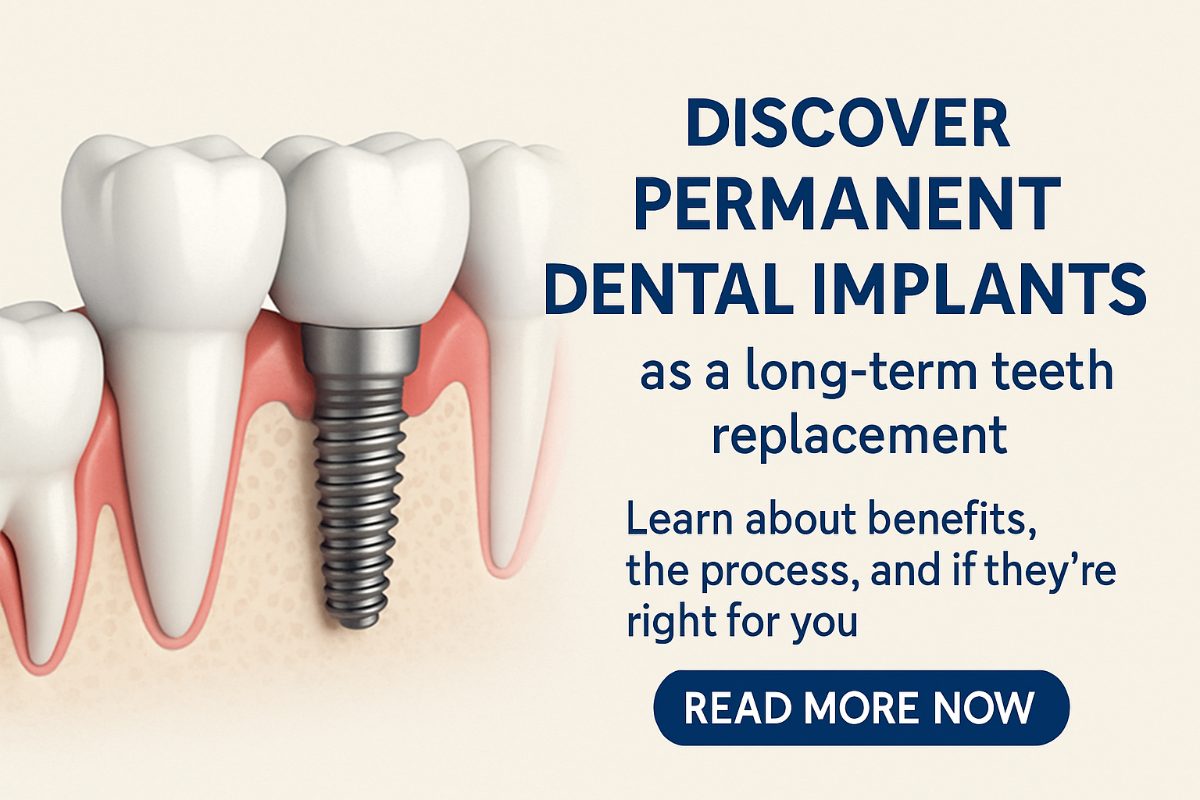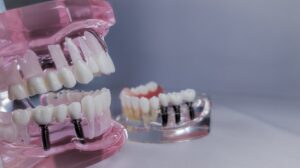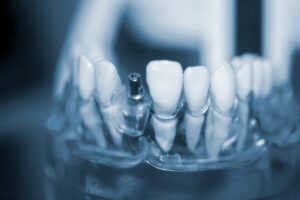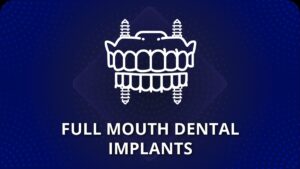Permanent dental implants are a long-term way to replace missing teeth. This post explains what permanent dental implants are, the pros and cons, who makes a good candidate, what the treatment looks like, and next steps if you want to learn more. Read on if you’re comparing implants to dentures or bridges, have been told you have “no bone,” or want to know what to expect from evaluation to final restoration.
What Are Permanent Dental Implants?
Permanent dental implants are titanium posts placed in the jaw to act like tooth roots. After healing, a crown, bridge, or full-arch prosthesis is attached. An implant crown replaces one tooth, an implant-supported bridge replaces several, and full-arch solutions (All‑on‑X) replace a whole row of teeth. Unlike removable dentures, permanent dental implants are fixed and designed to feel and function like natural teeth.
Benefits Of Permanent Dental Implants
Implants restore chewing and speech more reliably than dentures. They help preserve jawbone by transmitting chewing forces to bone, reducing bone loss over time. Implants are predictable long-term solutions with high success rates when planned and placed properly. Many patients report better comfort, confidence, and quality of life compared to traditional dentures or bridges.
Are Permanent Dental Implants Right For You?
General health and oral health factors
Good general and oral health improves implant success. Uncontrolled diabetes, active gum disease, and heavy smoking raise risks of implant failure. Most conditions can be managed or optimized with medical and dental care before implants are placed.
Bone quantity and quality
Enough jawbone is needed to hold an implant. If bone has shrunk after tooth loss, bone grafting or ridge augmentation can rebuild foundation for implants. Your clinician will review options; for some patients less invasive grafting works, while others need advanced approaches.
What To Expect During The Treatment Process
Initial evaluation and imaging
A clinical exam and 3D CT scan map your jaw and nerves to plan exact implant positions. This step is essential for surgery accuracy and to decide if grafting or special implants are needed.
Surgery and immediate recovery
On surgery day the implant is placed under local anesthesia (and sedation if desired). Expect swelling and mild discomfort for a few days. Most patients resume normal light activities within 48–72 hours and follow a soft-food diet while the implant integrates with bone.
Restoration and long-term follow-up
After healing (often 3–6 months), your final crown, bridge, or full-arch prosthesis is attached. Regular dental checkups and good oral hygiene keep implants healthy for many years.
Risks, Downsides, And Alternatives
Possible complications include infection, slow healing, implant failure, and higher upfront cost than dentures. Healing time is longer than removable options. Alternatives include removable dentures or fixed bridges, which may be simpler but can accelerate bone loss or affect adjacent teeth.
Advanced Options For Patients Told They Have “No Bone”
For severe bone loss, zygomatic, pterygoid, transsinus, and subperiosteal implants use different anchor points or custom frameworks to avoid grafting or provide support where the jawbone is thin. These are specialized techniques for complex cases and are chosen based on anatomy and patient needs. Advanced techniques for severe bone loss are an important consideration.
Why See A Board-Certified Implant Specialist For Permanent Dental Implants
Board-certified implant specialists have advanced training and experience with complex cases and modern techniques. That expertise improves predictability, especially for full-arch reconstructions and “no bone” patients.
About Our Practice And What We Offer
Dr. Michael Fioritto is one of about nine board-certified implant specialists in Ohio. Our practice uses facial, intraoral, and photogrammetry scanners and digital All‑on‑X workflows. We treat complex “no bone” cases and place zygomatic, pterygoid, transsinus, and subperiosteal implants. Many out-of-state patients meet with Dr. Fioritto the day before surgery and return home the day after. We offer free consultations and CT scans.
Next Steps: How To Learn If Permanent Dental Implants Are Right For You
Schedule a free consultation and CT scan to evaluate your options. Bring a list of medications and any recent dental records or X-rays. We coordinate care with referring dentists for postop checks and final restorations. Contact us to set up your consultation and get a personalized plan.






